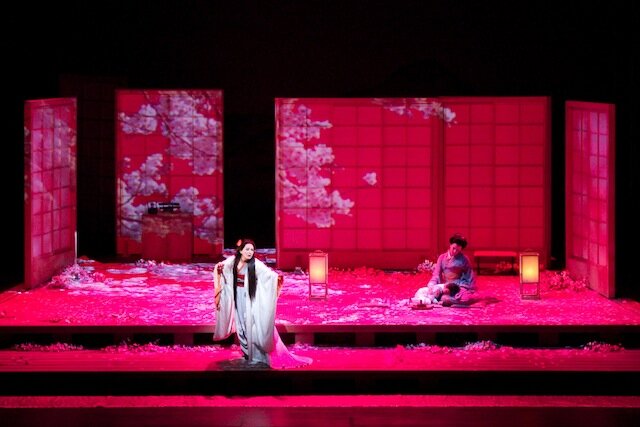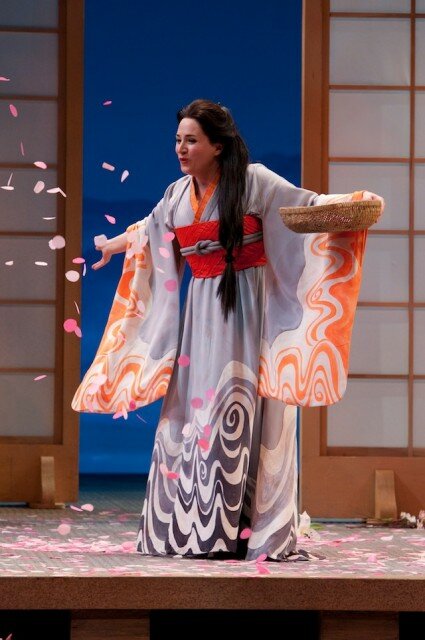I have a history with Madama Butterfly. To be honest, I have a history with Opera In General, which tends to color my opinions. And my opinion of Butterfly was that I didn’t like it so much. Okay, actually, I love–love–the music; it’s the story I’m not so fond of. So I went into Seattle Opera’s Madama Butterfly (through May 20; tickets) with a bit of a pre-formed opinion. For shame! Bernard Jacobson and I have learned a beautiful lesson.
I was blown away. This production was one of the best I’ve ever seen at Seattle Opera, and was definitely the best production of Butterfly I’ve ever seen. A simple raked stage, six shoji screens, beautiful lighting from Duane Schuler, and a gorgeously painted backdrop added up to a lush view that only served to enhance the singers and the music.
It was just so relatable! Many productions strive to be relatable, but many fail. It takes how long to die, and you’re singing the whole time? You really fell in love with your brother? Wait–you’re pretending to be that guy? But you guys don’t even look alike! It is the music that always saves opera’s crazy stories, yet it’s the music that sometimes is shunted away from the core of a new production.
But in Seattle Opera’s Madama Butterfly, the singing, the singers, and the music stay squarely center stage. And the singing in this production was glorious. Patricia Racette played Butterfly (or Cio-Cio-San) with grace, joy, and humanity, using all parts of her voice for dramatic effect. She is a consummate artist, and was in lovely voice on Saturday. She’s one of the bigger-voiced Cio-Cio-Sans I’ve heard, and had a nice warmth and depth from the top to the bottom.
As I joked to my friends on Sunday, many tenors think they can sing the role of Pinkerton, and few can. Italian Stefano Secco is one of the guys who can actually do it. His Pinkerton was a nuanced cad, and his high notes were beautiful. Sarah Larson, a Seattle Opera Young Artist, played Suzuki, and her relationship to Racette’s Cio-Cio-San was believable. Her performance had maturity and depth. She is well worth watching as her career takes off.
As Sharpless, Canadian Brett Polegato stole my heart. Between his adorable spats (the footwear, not the arguments) and his distinguished manner, I was wrapped around his little finger. (You can give me terrible and life-altering news any day, Sharpless!) He was the voice of reason in this production, and I could have listened to him all day.
The sparse set (from Canadian Opera) was filled in with enough detail that it didn’t feel too empty: it was a suggestion of a room and a garden. Director Peter Kazaras staged the show cleanly and clearly. Nothing felt extraneous, and everything, even some of the stylized hand gestures, felt organic. The Flower Duet comes together particularly well, between the music and the delightful pink flower petals.
In short, go see it! I laughed, and man! did I cry.




